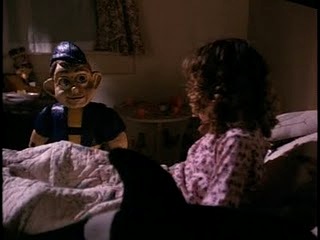If you’re a cable subscriber with the Fearnet VOD service you have until April 30 to see a the little-known Pinocchio’s Revenge, a killer doll movie from 1996. It’s a dumb title and a Chucky rip-off, but it is also, surprisingly, one of the best arguments against the death penalty in any narrative film.
It’s a balancing act to get you interested in this film without leading you to expect anything. There are recognized masters like Samuel Fuller, who may require viewers to see past certain inadequacies in order to see the brilliance of his work. Kevin S. Tenney, director of Pinocchio’s Revenge, certainly does not have that kind of pedigree. Tenney is (un)known for being a director of B-level straight-to-video titles. His best known pictures are Witchboard, starring Whitesnake video vixen Tawny Kitaen (and another film with great subtextual value as demonstrated in the indispensible Men, Women and Chainsaws: Gender in the Modern Horror Film by Carol J. Clover) and a film of minor cult notoriety, Night of the Demons, a remake of which is slated for release in September. But beyond the T&A, the plodding narrative and the plausibility holes is something unexpected in Pinocchio’s Revenge.
Rosalind Allen plays Jennifer Garrick, a defense attorney and single mother. She represents a murderer executed by the state. One of his possessions, a wooden doll winds up in the hands of Garrick’s daughter Zoe (Brittany Alyse Smith). Homicides and accidents pile up, all at the hands of the puppet, yet it appears that Zoe is likely pulling the strings. Meanwhile, Jennifer’s next client, another murderer facing execution, refutes an insanity defense because the voices in his head are so real, he believes them to be as such. Therein lies the film’s anti-death penalty stance. The film is quite subtle in drawing parallels between the murderer awaiting his sentence and the disturbed young girl, who we know is a troubled child, and how their psychological makeup is a factor in their actions and should be considered in the punishment. The film does not go to great lengths to make the acknowledged killers human or sympathetic. Yet, Zoe is very relatable as a daughter and the viewer must recognize the links. Also, the Pinocchio metaphor, again applied subtly, indicates these are human beings and should be treated as such
It’s a leap of faith to recommend a movie that is almost certain to be dismissed (a 3.9 user rating on IMDB if you need metrics), but Pinocchio’s Revenge is a unique work and its appearance on television is a rare event. It’s a film I’ve talked about for years and hope is finally understood.

